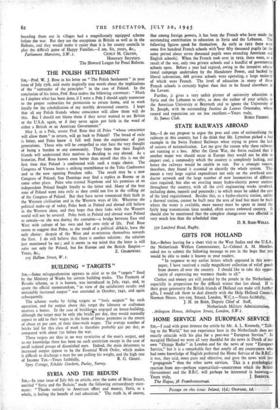THE POLISH SETTLEMENT
SIR,—Prof. W. J. Rose in his letter on " The Polish Settlement " in your issue of July 13th, said many tragically true words about the implications of the " surrender of the principles " in the case of Poland. In the conclusion of his letter, Prof. Rose makes the following statement: " Much as I deplore what has been done, if I were a Pole I should apply tomorrow to the proper authorities for permission to return home, and to work loyally for the rehabilitation of my terribly devastated country. I hope that all my Polish friends whose conscience will allow them will do this. But I should not blame them if they never wanted to see Britain or the U.S.A. again, or if they never again put faith in the word of either a British or an American Government."
May I, as a Pole, assure Prof. Rose that all Poles " whose conscience will allow them " to return, will go back to Poland? The bread of exile is bitter, and Poles know it full well from the experience of past generations. Those who will be compelled to stay hate the very thought of being a burden to any community. They hope that their English friends will understand their motives in deciding to stay abroad. As a historian, Prof. Rose knows even better than myself that this is not the first time that Poland :s confronted with such a tragic choice. The Congress of Vienna bears a striking resemblance to the Yalta Conference and to the now opening Potsdam talks. The result may be a new Congress of Poland; San Domingo may find a replica in Burma or in some other place. Poles who trusted Napoleon and his promises of an independent Poland fought loyally to the bitter end. Many of the best sons of Poland went into exile as they could not live in the stifling air of the Congress of Poland. But they have never renounced their faith in the Western civilisation and in the Western ways of life. Whatever the political make-up of today, Poles both in Poland and abroad still believe in the Western ideas, and they hope that their links with the Western world will not be severed. Poles both in Poland and abroad want Poland to remain—as she was during the centuries—a bridge between East and West with culture of her own and her own style of life. Prof. Rose seems to suggest that Poles, as the result of a political debdcle, have the only choice: despair of the West and re-orientate themselves towards the East. I do still believe that there is another solution: the solution just mentioned by me ; and it seems to my mind that the latter is still safer not only for Poland, but for Europe and the British Empire.—


























 Previous page
Previous page